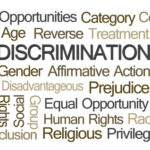Author Archives: Jay Butchko

Stereotypes and Employment Discrimination
Stereotypes are prevalent in our society, and people often make assumptions about others based on characteristics such as the city or state where they grew up, where they attended college, the type of car they drive, how much money they make, the kinds of clothes they wear, and more. While these kinds of stereotypes… Read More »

Which Employees Are Protected by Title VII?
Many job applicants and employees have protections against discrimination under Title VII of the Civil Rights Act of 1964, a federal law that prohibits various forms of employment discrimination. While Title VII is named frequently when questions about employee rights and discrimination arise, it is important to understand which employees are protected by Title… Read More »

When Are Employees in Florida Protected by the ADA?
The Americans with Disabilities Act of 1990 (ADA) is a federal law that has been protecting individuals with disabilities from discrimination in various capacities since its enactment, including in employment contexts. In 2008, the Americans with Disabilities Act Amendments Act of 2008 (ADAAA) was passed and took effect on January 1, 2009, and it… Read More »

Employment Discrimination and HIV Status
Job applicants and employees in Florida have legal protections against discrimination on the basis of their human immunodeficiency virus (HIV) status. To be clear, if you have HIV or acquired immunodeficiency syndrome (AIDS), even if the virus is asymptomatic, you cannot be treated unfavorably by a prospective employer or a current employer. Further, in… Read More »

What is Quid Pro Quo Harassment?
In a South Florida workplace, unlawful harassment can result in significant harm to the targeted job applicant or employee, as well as to the morale of the general working environment. One type of harassment that is commonly associated with sexual harassment in the workplace is known as “quid pro quo” harassment. What does this… Read More »

When Does a Work Environment Become “Hostile”?
Unlawful harassment in Florida employment contexts can take two separate forms: quid pro quo harassment (typically occurs in sexual harassment cases), and hostile work environment harassment, which can occur in a wide range of circumstances. In order for an employee to be eligible for a remedy for hostile work environment harassment, it will be… Read More »

What Are the Differences Between the EEOC and FCHR?
If you experienced any kind of adverse or unfair treatment in a recent job interview or in your current employment situation, you may be considering the possibility of filing an employment discrimination claim. The first thing you should do is to speak with a South Florida employment discrimination attorney who can help you to… Read More »

What is the Difference Between a Break and a Rest Period?
Employees in Florida who are classified as non-exempt — meaning in part that they must be paid minimum wage and must receive overtime pay at a rate of one and one-half times their regular rate of pay for hours worked beyond the 40-hour workweek — also have rights concerning rest periods and breaks. To… Read More »

Did I Experience Discrimination When My Employer Denied My Promotion?
If you were recently passed over for a promotion, you may be wondering if your employer discriminated against you in deciding to promote another employee instead. When an employee is denied a promotion, it is important to consider whether discrimination was a factor in the employer’s decision since this is a common way that… Read More »

Can Work-From-Home Employees Face Sexual Harassment?
If you work from home, or you have an entirely remote job, can you still file a sexual harassment claim? This is a question that many employees have had since 2020 when the COVID-19 pandemic results in millions of workers becoming remote employees due to health concerns. While pandemic safety protections are no longer… Read More »

